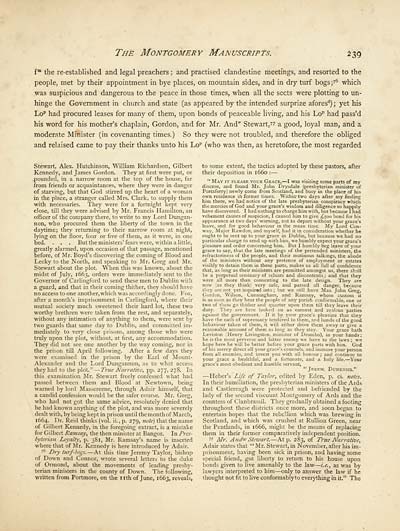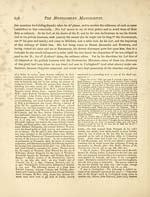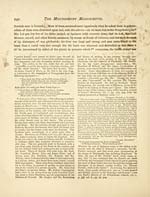Montgomery manuscripts
(253) Page 239
Download files
Complete book:
Individual page:
Thumbnail gallery: Grid view | List view

The Montgomery Manuscripts.
239
f m the re-established and legal preachers ; and practised clandestine meetings, and resorted to the
people, met by their appointment in bye places, on mountain sides, and in dry turf bogs;? 6 which
was suspicious and dangerous to the peace in those times, when all the sects were plotting to un-
hinge the Government in church and state (as appeared by the intended surprize afores d ); yet his
Lo p had procured leases for many of them, upon bonds of peaceable living, and his Lo p had pass'd
his word for his mother's chaplain, Gordon, and for Mr. And" Stewart," a good, loyal man, and a
moderate Minister (in covenanting times.) So they were not troubled, and therefore the obliged
and relaised came to pay their thanks unto his Lo p (who was then, as heretofore, the most regarded
Stewart, Alex. Hutchinson, William Richardson, Gilbert
Kennedy, and James Gordon. They at first were put, or
pounded, in a narrow room at the top of the house, far
from friends or acquaintances, where they were in danger
of starving, but that God stirred up the heart of a woman
in the place, a stranger called Mrs. Clark, to supply them
with necessaries. They were for a fortnight kept very
close, till they were advised by Mr. Francis Hamilton, an
officer of the company there, to write to my Lord Dungan-
non, who procured them the liberty of the town in the
daytime; they returning to their narrow room at night,
lying on the floor, four or five of them, as it were, in one
bed. . . . But the ministers' fears were, within a little,
greatly alarmed, upon occasion of that passage, mentioned
before, of Mr. Boyd's discovering the coming of Blood and
Lecky to the North, and speaking to Mr. Greg and Mr.
Stewart about the plot. When this was known, about the
midst of July, 1663, orders were immediately sent to the
Governor of Carlingford to send these men to Dublin with
a guard, and that in their coming thither, they should have
no access to one another, which was accordingly done. For,
after a month's imprisonment in Carlingford, where their
mutual society much sweetened their hard lot, these two
worthy brethren were taken from the rest, and separately,
without any intimation of anything to them, were sent by
two guards that same day to Dublin, and committed im-
mediately to very close prisons, among those who were
truly upon the plot, without, at first, any accommodation.
They did not see one another by the way coming, nor in
the prison till April following. After a few days they
were examined in the prison by the Earl of Mount-
Alexander and the Lord Dungannon, as to what access
they had to the plot." — True Narrative, pp. 277, 27S. In
this examination Mr. Stewart freely confessed what had
passed between them and Blood at Newtown, being
warned by lord Massereene, through Adair himself, that
a candid confession would be the safer course. Mr. Greg,
who had not got the same advice, resolutely denied that
he had known anything of the plot, and was more severely
dealt with, by being kept in prison until themonthof March,
1664. Dr. Reid thinks (vol. ii. ,p. 279, note) that the name
of Gilbert Kennedy, in the foregoing extract, is a mistake
for Gilbert Ramsay, the then minister at Bangor. In Pres-
byterian Loyalty, p. 3S1, Mr. Ramsay's name is inserted
where that of Mr. Kennedy is here introduced by Adair.
? 6 Dry turf-hogs. — At this time Jeremy Taylor, bishop
of Down and Connor, wrote several letters to the duke
of Ormond, about the movements of leading presby-
terian ministers in the county of Down. The following,
written from Portmore, on the nth of June, 1663, reveals,
to some extent, the tactics adopted by these pastors, after
their deposition in 1660 : —
" May it please your Grace, — I was visiting some parts of my
diocese, and found Mr. John Drysdale (presbyterian minister of
Portaferry) newly come from Scotland, and busy in the place of his
own residence in former times. Within* two days after my finding
him there, we had notice of the late presbyterian conspiracy which
the mercies of God and your grace's wisdom and diligence so happily
have discovered. I had nothing to charge him with, but because I had
vehement causes of suspicion, 1 caused him to give jC^oo bond for his
appearance at two days' warning, not to depart without your grace's
leave, and for good behaviour in the mean time. My Lord Con-
way, Major Rawdon, and myself, had it in consideration whether he
ought to be sent up to your grace in Dublin, but because we had no
particular charge to send up with him, we humbly expect your grace's
pleasure and order concerning him. But I humbly beg leave of your
grace to say, that the late meetings of the pretended ministers, the
refractoriness of the people, and their mutinous talkings, the abode
of the ministers without any pretence of employment or estates
visibly to detain them in these parts, makes us all full of confidence
that, as long as their ministers are permitted amongst us, there shall
be a perpetual seminary of schism and discontents ; and that they
were all more than consenting to the late design. They are
now (as they think) very safe, and passed all danger, because
they are not yet inquired into ; but we still have Mas. John Greg,
Gordon, Wilson, Cunningham, and Ramsay, whose custom it
is as soon as they hear the people of any parish conformable, one or
two of tlieni go thither and quarter upon them till they leave their
duty. They are here looked on as earnest and zealous parties
against the government. If it be your grace's pleasure that they
have the oath of supremacy tendered to them, and bonds of the good
behaviour taken of them, it will either drive them away or give a
reasonable account of them as long as they stay. Your grace hath
Leviston (Henry Livingston, minister of Drumbo), in your hands;
he is the most perverse and bitter enemy we have to the laws ; we
hope here he will be better before your grace parts with him. God
of his mercy direct all your grace's counsels, and immure your person
from all enemies, and invest you with all honour ; and continue to
your grace a healthful, and a fortunate, and a holy life. — Your
grace's most obedient and humble servant,
"Jerem. Dunensis."
— Heber's Life of Taylor, edited by Eden, p. ci. notes.
In their humiliation, the presbyterian ministers of the Aids
and Castlereagh were protected and befriended by the
lady of the second viscount Montgomery of Ards and the
countess of Clanbrassil. They gradually obtained a footing
throughout these districts once more, and soon began to
entertain hopes that the rebellion which was brewing in
Scotland, and which was crushed at Rullion Green, near
the Pentlands, in 1666, might be the means of replacing
them in their former comparatively independent position.
" Mr. And™ Stewart. — At p. 2S3, of True Narrative,
Adair states that " Mr. Stewart, in November, after his im-
prisonment, having been sick in prison, and having some
special friend, got liberty to return to his house upon
bonds given to live amenably to the law — i.e., as was by
lawyers interpreted to him — only to answer the law if he
thought not fit to live conformably to everything in it." The
239
f m the re-established and legal preachers ; and practised clandestine meetings, and resorted to the
people, met by their appointment in bye places, on mountain sides, and in dry turf bogs;? 6 which
was suspicious and dangerous to the peace in those times, when all the sects were plotting to un-
hinge the Government in church and state (as appeared by the intended surprize afores d ); yet his
Lo p had procured leases for many of them, upon bonds of peaceable living, and his Lo p had pass'd
his word for his mother's chaplain, Gordon, and for Mr. And" Stewart," a good, loyal man, and a
moderate Minister (in covenanting times.) So they were not troubled, and therefore the obliged
and relaised came to pay their thanks unto his Lo p (who was then, as heretofore, the most regarded
Stewart, Alex. Hutchinson, William Richardson, Gilbert
Kennedy, and James Gordon. They at first were put, or
pounded, in a narrow room at the top of the house, far
from friends or acquaintances, where they were in danger
of starving, but that God stirred up the heart of a woman
in the place, a stranger called Mrs. Clark, to supply them
with necessaries. They were for a fortnight kept very
close, till they were advised by Mr. Francis Hamilton, an
officer of the company there, to write to my Lord Dungan-
non, who procured them the liberty of the town in the
daytime; they returning to their narrow room at night,
lying on the floor, four or five of them, as it were, in one
bed. . . . But the ministers' fears were, within a little,
greatly alarmed, upon occasion of that passage, mentioned
before, of Mr. Boyd's discovering the coming of Blood and
Lecky to the North, and speaking to Mr. Greg and Mr.
Stewart about the plot. When this was known, about the
midst of July, 1663, orders were immediately sent to the
Governor of Carlingford to send these men to Dublin with
a guard, and that in their coming thither, they should have
no access to one another, which was accordingly done. For,
after a month's imprisonment in Carlingford, where their
mutual society much sweetened their hard lot, these two
worthy brethren were taken from the rest, and separately,
without any intimation of anything to them, were sent by
two guards that same day to Dublin, and committed im-
mediately to very close prisons, among those who were
truly upon the plot, without, at first, any accommodation.
They did not see one another by the way coming, nor in
the prison till April following. After a few days they
were examined in the prison by the Earl of Mount-
Alexander and the Lord Dungannon, as to what access
they had to the plot." — True Narrative, pp. 277, 27S. In
this examination Mr. Stewart freely confessed what had
passed between them and Blood at Newtown, being
warned by lord Massereene, through Adair himself, that
a candid confession would be the safer course. Mr. Greg,
who had not got the same advice, resolutely denied that
he had known anything of the plot, and was more severely
dealt with, by being kept in prison until themonthof March,
1664. Dr. Reid thinks (vol. ii. ,p. 279, note) that the name
of Gilbert Kennedy, in the foregoing extract, is a mistake
for Gilbert Ramsay, the then minister at Bangor. In Pres-
byterian Loyalty, p. 3S1, Mr. Ramsay's name is inserted
where that of Mr. Kennedy is here introduced by Adair.
? 6 Dry turf-hogs. — At this time Jeremy Taylor, bishop
of Down and Connor, wrote several letters to the duke
of Ormond, about the movements of leading presby-
terian ministers in the county of Down. The following,
written from Portmore, on the nth of June, 1663, reveals,
to some extent, the tactics adopted by these pastors, after
their deposition in 1660 : —
" May it please your Grace, — I was visiting some parts of my
diocese, and found Mr. John Drysdale (presbyterian minister of
Portaferry) newly come from Scotland, and busy in the place of his
own residence in former times. Within* two days after my finding
him there, we had notice of the late presbyterian conspiracy which
the mercies of God and your grace's wisdom and diligence so happily
have discovered. I had nothing to charge him with, but because I had
vehement causes of suspicion, 1 caused him to give jC^oo bond for his
appearance at two days' warning, not to depart without your grace's
leave, and for good behaviour in the mean time. My Lord Con-
way, Major Rawdon, and myself, had it in consideration whether he
ought to be sent up to your grace in Dublin, but because we had no
particular charge to send up with him, we humbly expect your grace's
pleasure and order concerning him. But I humbly beg leave of your
grace to say, that the late meetings of the pretended ministers, the
refractoriness of the people, and their mutinous talkings, the abode
of the ministers without any pretence of employment or estates
visibly to detain them in these parts, makes us all full of confidence
that, as long as their ministers are permitted amongst us, there shall
be a perpetual seminary of schism and discontents ; and that they
were all more than consenting to the late design. They are
now (as they think) very safe, and passed all danger, because
they are not yet inquired into ; but we still have Mas. John Greg,
Gordon, Wilson, Cunningham, and Ramsay, whose custom it
is as soon as they hear the people of any parish conformable, one or
two of tlieni go thither and quarter upon them till they leave their
duty. They are here looked on as earnest and zealous parties
against the government. If it be your grace's pleasure that they
have the oath of supremacy tendered to them, and bonds of the good
behaviour taken of them, it will either drive them away or give a
reasonable account of them as long as they stay. Your grace hath
Leviston (Henry Livingston, minister of Drumbo), in your hands;
he is the most perverse and bitter enemy we have to the laws ; we
hope here he will be better before your grace parts with him. God
of his mercy direct all your grace's counsels, and immure your person
from all enemies, and invest you with all honour ; and continue to
your grace a healthful, and a fortunate, and a holy life. — Your
grace's most obedient and humble servant,
"Jerem. Dunensis."
— Heber's Life of Taylor, edited by Eden, p. ci. notes.
In their humiliation, the presbyterian ministers of the Aids
and Castlereagh were protected and befriended by the
lady of the second viscount Montgomery of Ards and the
countess of Clanbrassil. They gradually obtained a footing
throughout these districts once more, and soon began to
entertain hopes that the rebellion which was brewing in
Scotland, and which was crushed at Rullion Green, near
the Pentlands, in 1666, might be the means of replacing
them in their former comparatively independent position.
" Mr. And™ Stewart. — At p. 2S3, of True Narrative,
Adair states that " Mr. Stewart, in November, after his im-
prisonment, having been sick in prison, and having some
special friend, got liberty to return to his house upon
bonds given to live amenably to the law — i.e., as was by
lawyers interpreted to him — only to answer the law if he
thought not fit to live conformably to everything in it." The
Set display mode to:
![]() Universal Viewer |
Universal Viewer | ![]() Mirador |
Large image | Transcription
Mirador |
Large image | Transcription
Images and transcriptions on this page, including medium image downloads, may be used under the Creative Commons Attribution 4.0 International Licence unless otherwise stated. ![]()
| Histories of Scottish families > Montgomery manuscripts > (253) Page 239 |
|---|
| Permanent URL | https://digital.nls.uk/95235963 |
|---|
| Description | A selection of almost 400 printed items relating to the history of Scottish families, mostly dating from the 19th and early 20th centuries. Includes memoirs, genealogies and clan histories, with a few produced by emigrant families. The earliest family history goes back to AD 916. |
|---|

